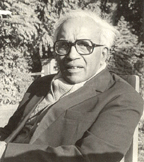 People's Democracy
People's Democracy
(Weekly
Organ of the Communist Party of India (Marxist)
No. 27
July 03, 2005
(Weekly
Organ of the Communist Party of India (Marxist)
|
Vol.
XXIX
No. 27 July 03, 2005 |
E M S Namboodiripad

Excerpts
from the article “Commitments Fulfilled” by E M S Namboodiripad published on
the occasion of the 20th anniversary of the People’s Democracy, dated June 23, 1985.
OUR
Party had the misfortune of being boycotted by almost the entire world Communist
movement for the major part of the 20-year period. The Communist Party of China
which maintained fraternal relations with us for the first few years,
subsequently broke them. The CPSU had no contact with us for most of the time.
Our adversaries had reason for their glee that we were isolated in the
international movement.
Today
however, fraternal relations with the Chinese Party have been fully restored,
while our relations with the Soviet Party have become almost completely normal.
We are considered as part of the world Communist movement.
This
change in the position of our Party in the world Communist movement is
attributed in the bourgeois media, and even in the writings of the CPI press, to
a supposed change in our attitude to the Soviet and Chinese Parties. We are
supposed to have rallied behind the Soviets giving up our former “pro-China”
positions. How divorced this is from reality can be seen from certain
incontrovertible facts:
Firstly,
in the very Seventh Congress where we declared ourselves as the real Communist
Party of India – later the CPI(M) – we scrupulously confined ourselves to
serious discussions on the internal questions of the Indian revolution,
deferring for a more appropriate future the discussion on questions of dispute
in the international Communist movement. This was done for the simple reason
that we did not want to commit ourselves to a position on these questions before
we had had time to make intensive studies of the problem. Further more, on the
internal questions of the Indian revolution which we discussed in detail before
adopting the Party Programme, we adopted positions which were at variance with
those of the Soviet and Chinese parties. There is therefore no substance in the
argument that we were originally with the Chinese Party on international and
national questions.
Secondly,
once we started discussing the questions of dispute in the international
movement, our differences with the Soviet as well as the Chinese Parties became
clear. It is not as if we were “equidistant” from the Soviet and Chinese
Parties as is alleged in the bourgeois media. The fact is that on every
individual problem every change in the situation, we took up our own independent
positions, supporting positions which we found correct and opposing those which
appeared to us as incorrect.
In
the early days of the cultural revolution in China, for example, we generally
were in agreement with it, but, as developments along the lines laid down by the
Chinese Central Committee unfolded themselves, we became more and more critical.
In fact we wrote a highly critical article on the Ninth Congress of the Chinese
Party. We could not reconcile ourselves to the line, which was subsequently
criticised by the Chinese Party itself.
As
for the CPSU, lack of fraternal relations with us did not stand in the way of
our appreciating the steps taken by the Soviet Party in relation to the
counter-revolution in Czechoslovakia in 1968. Nor did we have any hesitation in
reiterating our adherence to the Marxist-Leninist theoretical postulates of the
dictatorship of the proletariat, proletarian internationalism, the leading role
of the Party, and so on, when these came under attack in the international
Communist movement.
In
the meantime, we were happy in welcoming the Indo-Soviet Treaty of Friendship
and Co-operation that came into force in the early 1970s. We were equally happy
that the long isolation of the People’s Republic of China in the world bodies
was broken and its rightful position in the United Nations restored. We welcomed
the first hesitant steps taken by the Indian and Chinese leaders to normalise
state-to-state relations between the two countries.
Thirdly,
in the present day international political context we are appreciative of and
extend our sincere support to the peace initiatives taken by the Soviet Party
and government. This however does not mean that we are cent per cent in
agreement with the Soviet Party on every question; we do have with our Soviet
comrades but it is not these that are important thing is the urgency of having
the broadest possible mobilisation for peace, in which the Soviet comrades are
playing the leading role.
As
for the Chinese Party, we also have our reservations and differences with them
on important question. However, as the political Resolution of the Vijaywada
Congress said: “those
who simply denounce People’s China along with US imperialism and forget that
it is a Socialist country, serve the cause of international disunity, and bring
grist to the mill of imperialism…. The criticism (of China) must be made with
the expectation that Socialist China will overcome its present-day aberrations
and take its legitimate place in the fight against imperialism and strengthen
the unity of the Socialist forces.”
We
are, in other words, hopeful that the disunity in the international movement
which still blocks the progress of the world revolution will be overcome.